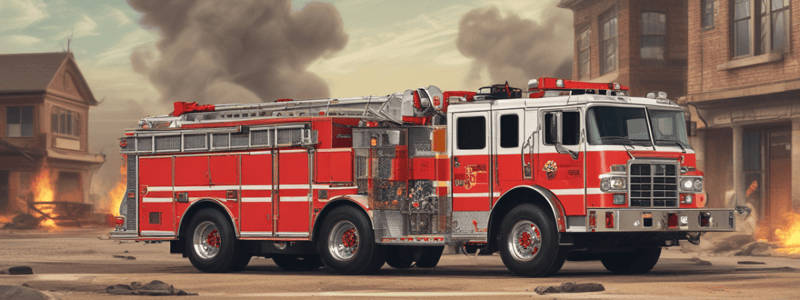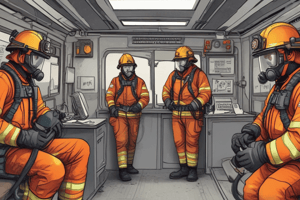Podcast
Questions and Answers
Who has the authority to issue a written reprimand to Fire Rescue personnel?
Who has the authority to issue a written reprimand to Fire Rescue personnel?
What is the consequence after an employee has received a written reprimand?
What is the consequence after an employee has received a written reprimand?
Which supervisory staff can recommend a suspension?
Which supervisory staff can recommend a suspension?
How many shifts off are imposed before dismissal for an employee who has already received 1-3 shifts off?
How many shifts off are imposed before dismissal for an employee who has already received 1-3 shifts off?
Signup and view all the answers
Who has the ultimate authority to dismiss an employee from Fire Rescue?
Who has the ultimate authority to dismiss an employee from Fire Rescue?
Signup and view all the answers
What is the primary responsibility of supervisors in the Fire Rescue personnel structure?
What is the primary responsibility of supervisors in the Fire Rescue personnel structure?
Signup and view all the answers
How long do suspensions remain applicable for consideration of cumulative disciplinary action?
How long do suspensions remain applicable for consideration of cumulative disciplinary action?
Signup and view all the answers
What form is used to document disciplinary actions against Fire Rescue personnel?
What form is used to document disciplinary actions against Fire Rescue personnel?
Signup and view all the answers
What is the result if an employee receives two disciplinary actions in different alphabetical groupings?
What is the result if an employee receives two disciplinary actions in different alphabetical groupings?
Signup and view all the answers
Which option best describes the conversion rate for shift changes?
Which option best describes the conversion rate for shift changes?
Signup and view all the answers
What happens to a warning or written reprimand after the 12-month period?
What happens to a warning or written reprimand after the 12-month period?
Signup and view all the answers
Which type of disciplinary action can be superseded by demotion?
Which type of disciplinary action can be superseded by demotion?
Signup and view all the answers
What is the consequence of violating the Fire Rescue Rules and Regulations?
What is the consequence of violating the Fire Rescue Rules and Regulations?
Signup and view all the answers
What is the primary duty of supervisors regarding Fire Rescue’s Rules, Regulations, and Policies?
What is the primary duty of supervisors regarding Fire Rescue’s Rules, Regulations, and Policies?
Signup and view all the answers
Which of the following best describes the role of supervisors in relation to Fire Rescue’s policies?
Which of the following best describes the role of supervisors in relation to Fire Rescue’s policies?
Signup and view all the answers
Which responsibility is NOT typically associated with the duty of supervisors in Fire Rescue?
Which responsibility is NOT typically associated with the duty of supervisors in Fire Rescue?
Signup and view all the answers
In the context of Fire Rescue, what is a critical expectation from supervisors?
In the context of Fire Rescue, what is a critical expectation from supervisors?
Signup and view all the answers
What is the implication for supervisors if Fire Rescue’s Rules and Regulations are not followed?
What is the implication for supervisors if Fire Rescue’s Rules and Regulations are not followed?
Signup and view all the answers
What is expected of Fire Rescue personnel regarding adherence?
What is expected of Fire Rescue personnel regarding adherence?
Signup and view all the answers
Which of the following is NOT included in the Fire Rescue Rules and Regulations?
Which of the following is NOT included in the Fire Rescue Rules and Regulations?
Signup and view all the answers
What is the role of policies in Fire Rescue’s adherence framework?
What is the role of policies in Fire Rescue’s adherence framework?
Signup and view all the answers
Fire Rescue personnel are required to follow which of the following?
Fire Rescue personnel are required to follow which of the following?
Signup and view all the answers
What is the primary purpose of the Fire Rescue Rules and Regulations?
What is the primary purpose of the Fire Rescue Rules and Regulations?
Signup and view all the answers
What is required to document all disciplinary actions in Fire Rescue?
What is required to document all disciplinary actions in Fire Rescue?
Signup and view all the answers
Which statement accurately reflects the documentation process for disciplinary actions in Fire Rescue?
Which statement accurately reflects the documentation process for disciplinary actions in Fire Rescue?
Signup and view all the answers
Why is documentation of disciplinary action important in Fire Rescue?
Why is documentation of disciplinary action important in Fire Rescue?
Signup and view all the answers
What could be the consequence of failing to document disciplinary actions appropriately?
What could be the consequence of failing to document disciplinary actions appropriately?
Signup and view all the answers
What is the primary form used to communicate violations within Fire Rescue?
What is the primary form used to communicate violations within Fire Rescue?
Signup and view all the answers
What is the duration of suspensions in Fire Rescue?
What is the duration of suspensions in Fire Rescue?
Signup and view all the answers
Which of the following best describes the time frame for considering suspensions in disciplinary actions?
Which of the following best describes the time frame for considering suspensions in disciplinary actions?
Signup and view all the answers
What happens to a suspension after a 24-month period?
What happens to a suspension after a 24-month period?
Signup and view all the answers
In the context of Fire Rescue, how long will suspensions remain effective?
In the context of Fire Rescue, how long will suspensions remain effective?
Signup and view all the answers
How long is the applicable period for suspensions to be considered during disciplinary reviews?
How long is the applicable period for suspensions to be considered during disciplinary reviews?
Signup and view all the answers
What occurs after the 12-month period following a Warning or Written Reprimand?
What occurs after the 12-month period following a Warning or Written Reprimand?
Signup and view all the answers
Which statement correctly describes the impact of a Warning on disciplinary actions after one year?
Which statement correctly describes the impact of a Warning on disciplinary actions after one year?
Signup and view all the answers
How does the expiration of a Written Reprimand after 12 months affect a personnel's record?
How does the expiration of a Written Reprimand after 12 months affect a personnel's record?
Signup and view all the answers
What is the duration after which a Warning can no longer be considered for cumulative disciplinary action?
What is the duration after which a Warning can no longer be considered for cumulative disciplinary action?
Signup and view all the answers
What happens to disciplinary actions taken before a 12-month period is completed?
What happens to disciplinary actions taken before a 12-month period is completed?
Signup and view all the answers
Study Notes
Policy Overview
- Fire Rescue personnel are accountable for their actions regarding infractions of rules, regulations, and policies.
- Supervisors are tasked with ensuring adherence to Fire Rescue Rules and uphold objectivity, fairness, and equity in management.
Documentation
- Personnel must follow the Fire Rescue Rules, Regulations, SOGs, protocols, and memorandums.
- Violating these guidelines can lead to disciplinary action, which will be recorded on the Notification and Acknowledgment of Violation of Rules and Regulations form (FR-A-101).
Cumulative Discipline
- Disciplinary actions escalate if personnel have prior infractions in the same alphabetical grouping or two in different groupings.
- After 12 months, a Warning or Written Reprimand can no longer factor into cumulative discipline; however, suspensions remain valid for 24 months.
Demotion
- Supervisors may demote personnel instead of imposing a suspension for infractions that typically warrant suspension.
Conversion Rate
- The conversion rate for personnel shifts is: one 24-hour shift equates to two 8-hour days off.
Disciplinary Action Authority
- Various supervisory levels have the authority to initiate specific disciplinary actions:
- Warning: Initiated by Lieutenant, Operational Captain, ARFF Captain, Special Operations Captain, or higher.
- Written Reprimand: Also initiated by Lieutenant, Operational Captain, ARFF Captain, Special Operations Captain, or higher.
- Recommend Suspension: Battalions Chiefs can recommend a one-day suspension, with more extended suspensions needing District Chief approval.
- Recommend Demotion/Dismissal: District Chief or higher can propose demotion or termination.
- Dismissal/Demotion: Final authority lies with the Fire Rescue Administrator or Acting Fire Rescue Administrator.
Disciplinary Guidelines
- Written Reprimand: Results in 1-3 shifts off.
- 1-3 Shifts Off: May lead to 5 shifts off or possible dismissal.
- 5 Shifts Off: Directly leads to dismissal.
Policy Overview
- Fire Rescue personnel are accountable for their actions and infractions.
- Supervisors are tasked with enforcing adherence to Fire Rescue Rules, Regulations, and Policies.
- Supervisors must ensure objectivity, fairness, and equity in managing personnel.
Documentation
- Personnel must follow Fire Rescue Rules and Regulations, including policies, Standard Operating Guidelines (SOGs), and memorandums.
- Violations may result in disciplinary action documented on form FR-A-101.
Cumulative Discipline
- Disciplinary actions are cumulative based on previous violations within the same alphabetical grouping.
- A Warning or Written Reprimand is void after 12 months, while suspensions last for 24 months.
Demotion
- Supervisors may demote personnel instead of issuing a suspension for certain offenses.
Shift Conversion Rate
- For Fire Rescue personnel, one 24-hour shift off equals two 8-hour days off.
Disciplinary Action Authority
- Various supervisory roles can initiate disciplinary actions:
- Warning: Lieutenant, Operational Captain, ARFF Captain, Special Operations Captain, Supervisor, or higher rank.
- Written Reprimand: Same supervisory roles as Warning.
- Recommend Suspension or Suspend: Battalion Chief (suspensions up to one day) or higher rank.
- Recommend Demotion or Dismissal: District Chief, Civilian Manager, or higher rank.
- Dismissal or Demotion: Fire Rescue Administrator or Acting Fire Rescue Administrator.
Disciplinary Guidelines
- Penalties escalate based on prior infractions:
- Written reprimand leads to 1-3 shifts off.
- 1-3 shifts off leads to 5 shifts off or Dismissal.
- 5 shifts off results in Dismissal.
Accountability and Responsibility
- Fire Rescue personnel are accountable for their actions and must adhere to established Rules, Regulations, and Policies.
- Supervisors are tasked with enforcing these rules and ensuring fairness and objectivity in managing personnel.
Documentation of Violations
- Personnel must comply with all Fire Rescue rules, protocols, and memorandums to avoid disciplinary action.
- Violations lead to documented disciplinary action using the Notification and Acknowledgment of Violation of Rules and Regulations form (FR-A-101).
Cumulative Discipline
- Multiple offenses within the same alphabetical grouping lead to increased disciplinary actions.
- A warning or written reprimand becomes irrelevant for cumulative discipline after 12 months; suspensions remain valid for 24 months.
Demotion Policy
- A supervisor may opt for demotion instead of suspension for offenses typically warranting suspension.
Shift Conversion
- For personnel transitioning from a 24-hour shift to an 8-hour shift, one shift off equates to a reduction of two 8-hour days.
Initiation of Disciplinary Actions
- Various supervisory roles can initiate disciplinary action based on infractions, including:
- Warning: Lieutenant and higher ranks
- Written Reprimand: Lieutenant and higher ranks
- Suspension Recommendations: Battalion Chief and higher ranks
- Demotion/Dismissal Recommendations: District Chief, Civilian Manager, and higher ranks
- Actual Dismissal or Demotion is enforced by the Fire Rescue Administrator or Acting Fire Rescue Administrator.
Disciplinary Guidelines
- Following a written reprimand, subsequent offenses result in penalties ranging from 1-3 shifts off, escalating to 5 shifts or Dismissal for repeated violations.
- The system is designed to maintain adherence to policies while providing a structured approach to discipline.
Accountability and Responsibility
- Fire Rescue personnel are accountable for their actions and infractions.
- Supervisors are tasked with ensuring adherence to Fire Rescue Rules, Regulations, and Policies.
- Supervisors must ensure objectivity, fairness, and equity in managing personnel.
Documentation
- Personnel must follow specific Fire Rescue Rules and Regulations, including policies, SOGs, protocols, and memorandums.
- Violations may lead to disciplinary action documented using form FR-A-101.
Cumulative Discipline
- Disciplinary actions depend on previous offenses within the same or different alphabetical groupings.
- A warning or written reprimand expires after 12 months for cumulative action.
- Suspensions remain active for 24 months before expiring.
Demotion
- A supervisor may opt for demotion instead of suspension for offenses warranting suspension.
Conversion Rate
- One 24-hour shift off equals two 8-hour days off for personnel on different shifts.
Initiation of Disciplinary Action
- Various supervisory levels can instigate disciplinary actions, including:
- Warning: Lieutenant, Operations Captain, ARFF Captain, Special Operations Captain, Supervisor, or higher rank.
- Written Reprimand: Similar supervisory ranks can issue reprimands.
- Suspension: Recommended by Battalion Chief (one day; multi-day needs District Chief approval).
- Demotion or Dismissal: Initiated by District Chief, Civilian Manager, or higher.
Disciplinary Guidelines
- Management of disciplinary actions is tiered based on offense history:
- Written reprimand leads to 1-3 shifts off.
- 1-3 shifts off can escalate to 5 shifts off or dismissal.
- 5 shifts off results in dismissal.
- Documented actions are crucial for maintaining accountability and transparency in the disciplinary process.
Accountability and Responsibilities
- Fire Rescue personnel are accountable for their actions and may face disciplinary consequences for violations.
- Supervisors are tasked with ensuring adherence to Fire Rescue’s Rules and Regulations.
Documentation of Violations
- Compliance with policies, SOGs, protocols, and memorandums is mandatory for all personnel.
- Violations result in disciplinary actions documented on form FR-A-101.
Cumulative Discipline
- Disciplinary actions increase in severity based on prior infractions within the same or different alphabetical groupings.
- A Warning or Written Reprimand expires as a basis for cumulative actions after 12 months.
- Suspensions remain in record for 24 months.
Demotion Policy
- Supervisors can opt for demotion instead of suspension for related offenses.
Shift Conversion
- For personnel transitioning from a 24-hour shift to an 8-hour shift, one shift off equates to two 8-hour days.
Initiating Disciplinary Action
- Various supervisory ranks have authority to initiate disciplinary procedures based on infractions:
- Warnings by Lieutenants and Captains.
- Written Reprimands by Lieutenants and above.
- Recommendations for suspension by Battalion Chiefs and higher ranks.
- Recommendations for demotion or dismissal by District Chiefs and higher.
Disciplinary Guidelines
- Disciplinary consequences escalate based on prior infractions:
- 1-3 shifts off lead to 5 shifts off for subsequent violations.
- 5 shifts off results in dismissal.
Documentation Requirement
- All disciplinary actions must be recorded using the designated Notification and Acknowledgment of Violation of Rules and Regulations form.
- Adherence to policies, SOGs, and regulations is expected from all Fire Rescue personnel.
Accountability and Responsibilities
- Fire Rescue personnel are accountable for their actions and may face disciplinary consequences for violations.
- Supervisors are tasked with ensuring adherence to Fire Rescue’s Rules and Regulations.
Documentation of Violations
- Compliance with policies, SOGs, protocols, and memorandums is mandatory for all personnel.
- Violations result in disciplinary actions documented on form FR-A-101.
Cumulative Discipline
- Disciplinary actions increase in severity based on prior infractions within the same or different alphabetical groupings.
- A Warning or Written Reprimand expires as a basis for cumulative actions after 12 months.
- Suspensions remain in record for 24 months.
Demotion Policy
- Supervisors can opt for demotion instead of suspension for related offenses.
Shift Conversion
- For personnel transitioning from a 24-hour shift to an 8-hour shift, one shift off equates to two 8-hour days.
Initiating Disciplinary Action
- Various supervisory ranks have authority to initiate disciplinary procedures based on infractions:
- Warnings by Lieutenants and Captains.
- Written Reprimands by Lieutenants and above.
- Recommendations for suspension by Battalion Chiefs and higher ranks.
- Recommendations for demotion or dismissal by District Chiefs and higher.
Disciplinary Guidelines
- Disciplinary consequences escalate based on prior infractions:
- 1-3 shifts off lead to 5 shifts off for subsequent violations.
- 5 shifts off results in dismissal.
Documentation Requirement
- All disciplinary actions must be recorded using the designated Notification and Acknowledgment of Violation of Rules and Regulations form.
- Adherence to policies, SOGs, and regulations is expected from all Fire Rescue personnel.
Studying That Suits You
Use AI to generate personalized quizzes and flashcards to suit your learning preferences.
Description
This quiz covers the responsibilities of Fire Rescue personnel regarding their actions and adherence to rules and regulations. It emphasizes the role of supervisors in ensuring fairness and accountability within the team. Test your understanding of these important policies and procedures.




